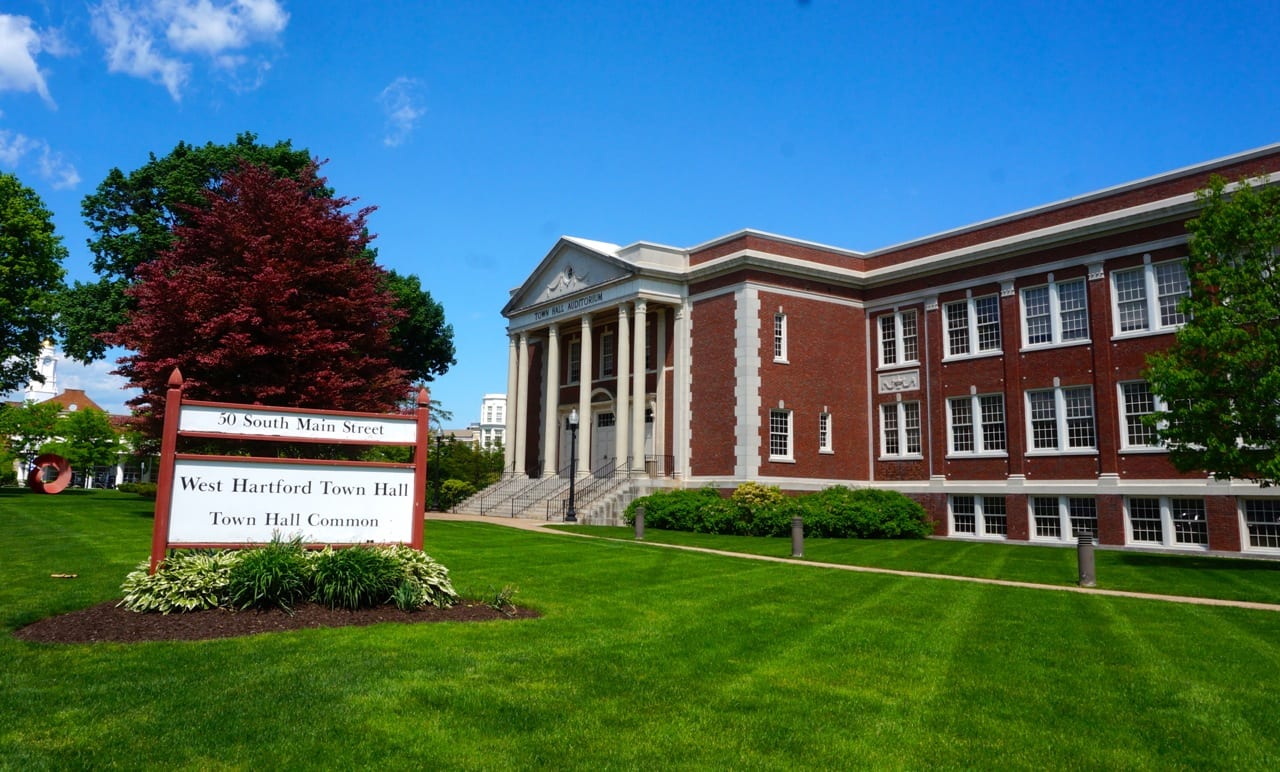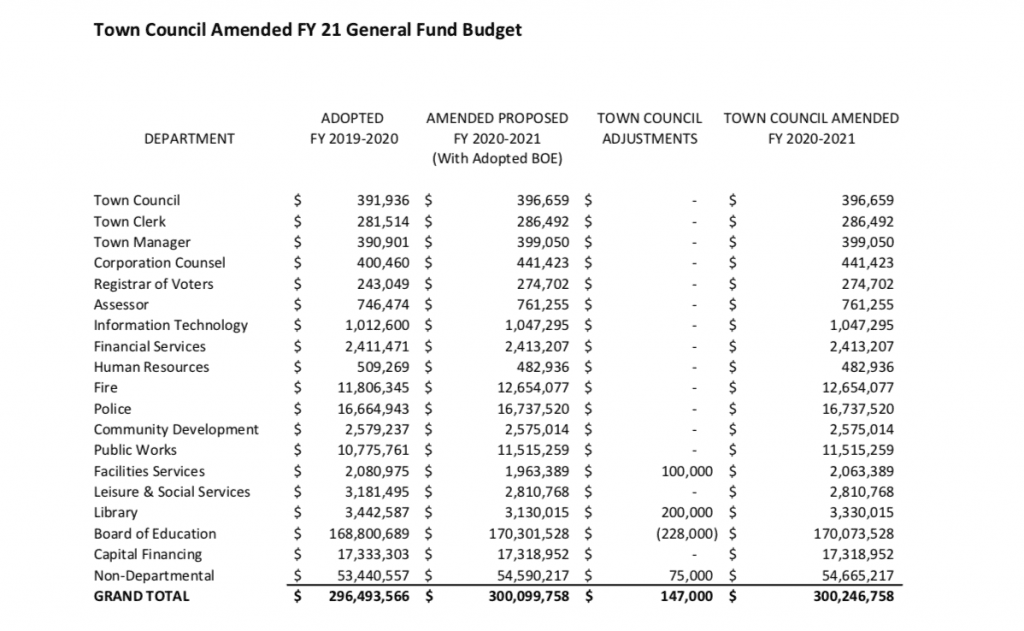Mill Rate Kept Flat in FY2021 Budget Adopted by West Hartford Town Council

Audio By Carbonatix

West Hartford Town Hall. Photo credit: Ronni Newton
The West Hartford Town Council voted 8-1 Tuesday night to adopt a FY2021 budget with a mill rate that remains unchanged from the previous fiscal year.
By Ronni Newton
The average West Hartford taxpayer will see their tax bill unchanged in the next fiscal year, following the Town Council’s adoption of the FY2021 budget Tuesday night.
The vote to keep the mill rate flat at 41.80 mills was bipartisan and nearly unanimous. Republican Chris Williams cast the lone “no” in the vote which was taken by roll call at the Council’s virtual meeting.

The spending plan totals $300,246,748, an increase of $3,753,192 or 1.27% over the FY2020 budget.
Town Manager Matt Hart’s original FY2021 budget proposal, delivered on March 10, was roughly $308.7 million, which would have been an increase of $12.2 million or 4.12%. Amid concerns of the economic impact of the COVID-19 pandemic, Mayor Shari Cantor and other Council members tasked Hart and town staff with revising the budget so there would not be a tax increase.
Hiring lags, reductions in overtime, and moving two police officers from the General Fund back to the Parking Fund helped achieve the budget reductions, as did the use of $1.5 million of the town’s surplus.
The tax bill for the average homeowner will remain unchanged for the upcoming fiscal year, Finance Director Peter Privitera said. Changes would only result from changes in the value of property owned, for example the purchase of a new car.
When Hart proposed budget amendments to the Town Council at a virtual meeting on April 20, a slightly lower mill rate was being considered, which would have resulted in a reduction of .06 mills, or a tax cut of 0.14%.
Following a series of budget hearings and discussions by the Council at its Finance and Administration Committee meetings, the decision was made to return $200,000 of proposed cuts to the library budget, and to return $100,000 to facilities. The Council had received testimony, by phone as well as through email, from well over 50 residents requesting that library services, programming, and hours be maintained, particularly at a time when residents are suffering economically and need access to the library. The funds returned to facilities will be used for extra cleaning and disinfecting that will be required.
Hart told We-Ha.com that the library director, Martha Church, will have the discretion to allocate the department’s budget. While the department still faces a reduction of more than $100,000 in its budget, the restoration of the $200,000 will allow for full operation by Oct. 1, although an opening schedule will be dependent on state mandates regarding access and gatherings. Hart said the library hopes to be implementing mobile services and outdoor programming over the summer.
The Board of Education unanimously adopted its budget on April 28, and added back $228,000 of the $4.6 million in cuts that Moore had presented at a workshop on April 21, funding the ASK program at Hall High School, a secondary school math coach, and amending the fees for sports. The Town Council, in its vote Tuesday night, removed that $228,000 addition from the Board’s budget.
The Town Council cannot make decisions about individual items in the Board of Education budget, and it will be up to the Board to determine how to allocate the $228,000 reduction.
Deputy Mayor Leon Davidoff, who chairs the Council’s Finance and Administration Committee, summarized the thought process that went into the crafting of the final budget. He said it was a good thing that even before the pandemic the Council had decided to review the town’s budget as a whole through that committee, rather than through its other individual committees as has been the practice in past years.
Since everything remains so fluid regarding the return of programs and services, “flexibility is key” and the committee will continue to review the budget on a regular basis in the event funding needs to be reallocated from one department to another, Davidoff said.
He – as did all of the other Council members – thanked town staff and his colleagues for their time, input, and involvement in the process. Davidoff also thanked the town manager and executive staff for taking a pay freeze for the upcoming fiscal year.
Davidoff also thanked the Board of Education for their collaboration. “This working relationship is the norm in our community – and we are unique in this respect – a good kind of unique in that there is trust between our two elected bodies. There are so many unknowns in this budget that this budget requires flexibility. As has been stated many times in the past and which holds true today, our school system remains one of our town’s greatest assets. We remain committed to having every child reach their fullest potential and we have tried our best to fund that priority,” Davidoff said.
Public safety remains a top priority, Davidoff said. “And to all those who serve as our first responders, let me first say ‘thank you’ on behalf of our community. Your dedication to serving all of our residents has been abundantly clear during this pandemic and we are committed to keeping our residents safe, to keeping you, our employees, safe and to provide you with the necessary resources to accomplish your mission.”
Davidoff expressed his hope that the Town Council would adopt the budget with a unanimous vote, like the Board of Education did for the first time in recent memory. “A 9-0 vote will would be unprecedented in recent history, but the message that it would send to our community would be that as governing leaders are working collaboratively and cooperatively for our community’s good.”
The flat mill rate, Davidoff said, “was accomplished by having both the general government and school department looking at ways to lower expenditures so as to not put an extra burden on our taxpayers in the upcoming year.”
While the pandemic has taken a toll on every family in town in some ways, it has also shown the strength of the town and willingness of residents to support one another.
“I have been so impressed how so many have stepped up to volunteer to assist those in need of food, how our students have adapted to virtual distance learning, how our community rallies together in times of crisis. Thank you to everyone for putting the ‘heart’ into West Hartford,” Davidoff said.
Republican Mary Fay voted to approve the budget, but with caveats, she said. Fay expressed her concerns about sustainability and the perception that expenses are being reined in just because of the COVID-19 pandemic.
“It maintains a level of lifestyle and education … it’s a reluctant vote for ‘yes.’ We can’t just be the party of ‘no,’ that’s not my style.” Fay expressed hope that the Council can continue to work together on a sustainable budget.
Democrat Liam Sweeney praised the bipartisan process and the way the town quickly adjusted to the new realties amid an atmosphere of uncertainty after receiving the initial budget presentation on the same night the governor declared a public health crisis.
“This is a flat budget that while we know there are many needs in town, there are so many families and people being impacted by this crisis … whether they are losing their jobs … or in some cases their loved ones .. this is a fair and reasonable budget,” Sweeney said. “The lens that I looked at when we started this process is we need to ensure that this is a budget that’s best for everyone,” he said, noting that there are things that need to be revised in the out years.
Williams, who ultimately cast his vote against the budget, said he first ran in 2015 on the platform that the town’s budget trends were unsustainable, and now in the midst of the pandemic nearly every resident is experiencing the economic impact of a pay cut, furlough, or layoff.
“This budget continues down the same road. The budget is not flat,” Williams said. He said spending increases $4 million, and noted that there were opportunities for reduction among the millions of dollars of pay increases in the Board of Education budget.
“I also have concerns about the fire department’s continued commitment to paramedic services,” Williams said, concerns which admits he has expressed often. Williams said the fire department has been a constant driver of the town’s budget, and he said 71% of the departments calls are medical, and the department’s budget is increasing due to EMS training, billing, and equipment.
Williams also said the town needs to consider building consolidation, including school buildings, and will need to take draconian measures when we won’t be able to rely on state aid. “The budget years ahead are going to be really challenging … we could have started with this budget cycle.”
Democrat Beth Kerrigan said the town manager’s initial budget presentation, when Council members sat in the same room, seems like a lifetime ago.
“COVID-19 demands us to see things differently … COVID demands that we prioritize in a way we never have before,” she said, thanking the town manager “for sharpening the pencil for a budget that serves the needs of all.”
Kerrigan said she was particularly touched by the emails from members of the community, who wrote to support more funding for the library due to concerns about others who don’t have internet service, access to a computer, or a safe place for their kids to do their school work. “I am so impressed with who and what we are,” she said, noting that one resident said they would rather not have a $15 tax reduction but instead ensure the funds are there for those who need it.
Minority Leader Lee Gold said the world changed quickly and the town had to pivot to create a new budget. “We are presented now with an opportunity to take a frank and honest look,” and can’t continue with a budget that creates unsustainability for taxpayers.
“Why did it take a global event to create a budget that is flat?” Gold said, noting that he is troubled that the flat budget was accomplished through cuts to the libraries, keeping pools closed, and laying off part time employees.
“The question we should be asking is whether each line of expenditure is needed at all,” Gold said, rather than working from last year’s budget, and including a look at every town building to determine its usefulness.
Gold said he thinks it’s important to have a multiyear budget discussion, and hopes to “move forward in a fiscally responsible way.” His vote in favor of the budget was to support taxpayers now, but also in the future, noting fear about a “slingshot effect.”
“The goal was to protect our taxpayers and make sure that they didn’t feel as much a pinch in their pocket as they had been. The budget being flat is a good thing,” Gold said after the meeting. “I think everybody put the welfare of our town above everything else. It wasn’t lost.”
“The budget in March is very different from what we have before us today,” Democrat Carol Blanks said. The former chair of the Board of Education, who is serving her first term on the Council, said it’s remarkable the Board passed its budget unanimously.
“We would like to reduce our mill rate if possible but what I think what we have before us as a flat budget is good for this point in time,” Blanks said, noting that right now, amid all of the uncertainty, we need to take things one day at a time. “I just want to go on record to say I am supporting this budget, I think it’s a responsible budget,” she said.
Democrat Ben Wenograd gave a special shout out to Library Director Martha Church – a “West Hartford hero” – and Public Works Director John Phillips who has to deal with budget impacts to his department, like the cost of waste management, that are completely out of his control.
“Over the past few years we have passed very reasonable budgets,” Wenograd said. “The budgets have been honest,” he said, and “you pay for what you get, but if you don’t pay for it you don’t get it.”
This year, Wenograd said, “This is obviously an unprecedented crisis. It’s raining and it’s time to use some rainy day funds.” While he said he would like to do a two-year budget, right now it’s guesswork even trying to do a two-month budget, and much will be dependent on the level of aid from the federal government.
Wenograd agreed with Williams and Gold about the need to look at the town’s physical plant.
Wenograd also noted the toll that COVID-19 has been taking in other ways. “We haven’t been treating the casualties of COVID the way we have with other tragedies. I do think we should reflect on that. This is a daily tragedy … We need to give each other space and understanding.”
“This has been an extraordinary challenge and loss for everyone,” Cantor, who spoke after Wenograd, said, and Council members need to remember and recognize why the meeting is being held on screen rather than in person.
While there is so much loss – of life, experience, and employment – and uncertainty, she urged everyone to find the silver linings and the precious moments of “simplicity, clearing of the air, birds, phone conversations, children appreciating free play in an unstructured way.”
The pandemic is like nothing that has ever been experience – like 2001, 2008, and the October snowstorm all rolled into one – with a public health crisis that has turned into an economic crisis.
“We need to reevaluate, reassess, and take this year and the next few years in chunks and readjust as we go,” said Cantor. This budget funds costs of the pandemic, the MDC assessment, pensions and healthcare. And while it uses 5% of the fund balance, “it’s raining,” she said. “We’re strong and we’re prepared for uncertainty and the future.”
Cantor gave special thanks to the herculean task that the schools have been doing, the technical support provided, town staff, communications, the library, Finance Director Peter Privitera, Social Services, paramedics, Plant and Facilities Director Bob Palmer, and Health District Director Aimee Krauss, among others.
Krauss was doing contact tracing before anyone else, using the services of the private school nurses “and probably saved cases and lives,” Cantor said.
“This is going to be a protracted challenge; we are not done,” Cantor said. There will be health challenges and the need to be innovative and pivot, probably in three-month chunks. She said the current budget provides residents with what they need now.
“Revenues are down … at the same time we are facing increasing cost, for health care, cost for services. … This is the perfect fiscal storm,” but this will not be our last, we will have other crises, storms, said Cantor.
“We need to rethink what normal means through this crisis, and coming out of this crisis. … We need to do our best.”
The Town Council already adopted two tax relief measures to assist residents and businesses impacted by the COVID-19 pandemic, and Tuesday night also voted to expand eligibility to anyone over age 59.5 who experiences a more than 20% decease in income, including if that income is retirement earnings or investment income. The tax deferment program allows for a reduced interest rate for late payments as well as defers the requirement to pay property taxes from July 1 to Oct. 1 for those who qualify for the program.
While West Hartford has previously had a tax collection rate in excess of 99%, the current economic situation will lead to uncertainty, Davidoff said.
“There will be more work to be done on the budget throughout the year. Yet, I am optimistic and confident that we will be stronger together. Times such as these call for putting West Hartford first. While it may seem that at times we are alone, we are all in this together,” Davidoff said.
Like what you see here? Click here to subscribe to We-Ha’s newsletter so you’ll always be in the know about what’s happening in West Hartford! Click the blue button below to become a supporter of We-Ha.com and our efforts to continue producing quality journalism.
 Loading...
Loading... 



Why don’t you Democrats think of cutting anything? Spend spend spend! We’re not all as rich of you on town council
[…] Details about the town’s adopted budget can be found here. […]